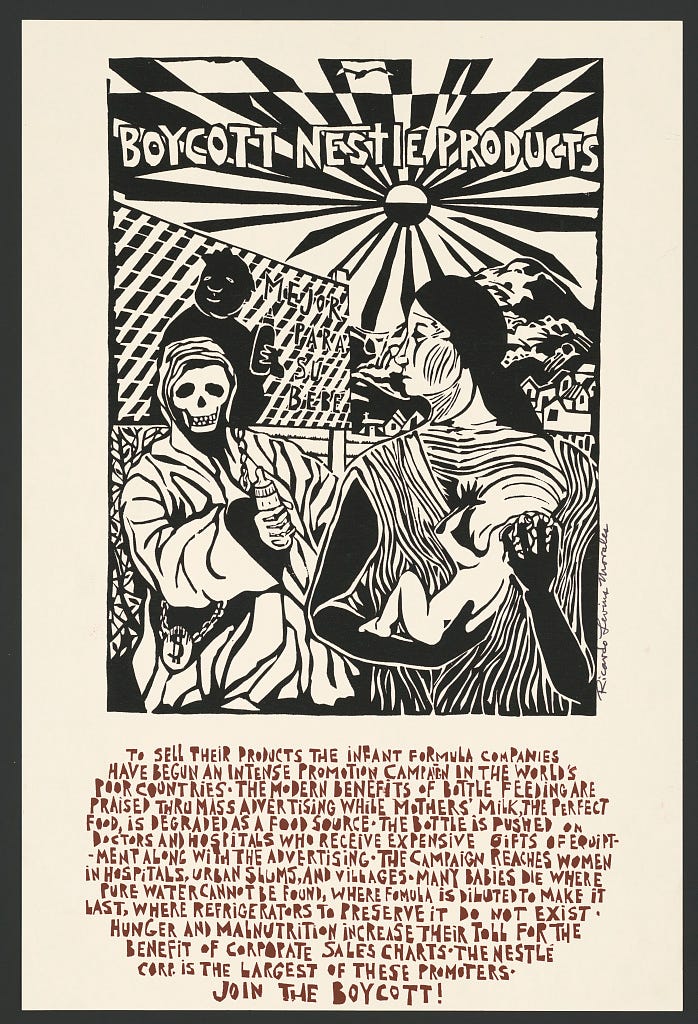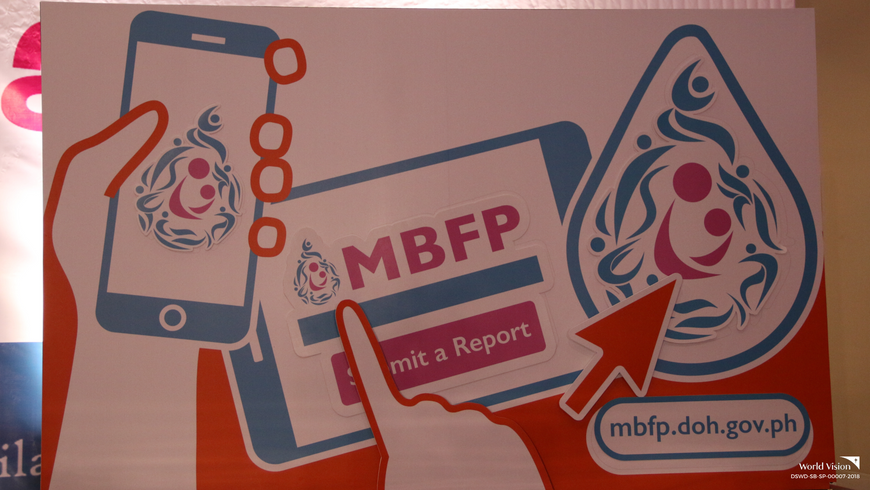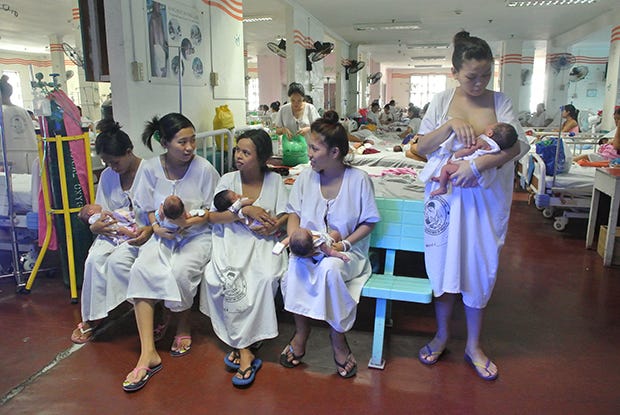Pinay Breastfeeders Defeat the Vampire Squid
The final paper in the Lancet series makes us believe that radical change is needed and even possible.
📚👩🏻💻🤱🏻We are out here doing the👉 LORD’S WORK!🤘 Reading and metabolizing studies, sending furious text messages, working ourselves into a lather in the name of lactivism! Consider upgrading your subscription, friend.📚👩🏻💻🤱🏻
Our last summary covered the first two papers in The Lancet’s blockbuster series on breastfeeding. Bottom line from those two papers: the predatory marketing schemes of profit-driven corporations, formula feeding has been normalized globally leading to suboptimal health outcomes for mothers and their babies. The series argues that commercial force driving down global breastfeeding rates amounts to a HUMAN RIGHTS violation against mothers and babies.
In the words of TV’s Succession, it’s a real shitshow at the fuck factory!
The final paper in the series explores the vast economic and political power of big formula and how they (along with the dairy lobby) create a ‘‘policy dystopia” wherein they spend millions on lobbying, fund and publish tens of thousands of ‘corporate research’ studies on behalf of their products, and put the screws to any body who opposes them.
And while it makes for some pretty grim reading there is an inspiring element to this whole mess-- and it involves you, literally, YOU.
🍼Let’s Do the Numbers: Behold the Bloodsucking Vampire Squid of Corporate Interests 🐙🩸
Between 2007 and 2018, the largest six formula companies together spent $55 million on lobbying the US government of which $43.8 million was spent by Abbott alone.
Of Abbott's expenditure, $20.0 million (45.8%), was dedicated to trade-related concerns with foreign countries.
In 2016, the formula industry spent almost $7 million dollars on lobbying the World Health Organization to water down regulation around formula trade and marketing.
In 2020, ‘follow-up formulas’ and ‘toddler milks’ comprised 69% of the world's total powdered formula sales by volume. The Lancet underscores this mind boggling number: “the most formula sales are superfluous to human need, unnecessarily use scarce natural resources, and cause otherwise avoidable environmental harm.”
Here’s a snapshot of the real cost of formula in a developing country: in Indonesia, the cost of purchasing a budget brand of formula equates to 15% of a working parent's average monthly salary-- not including the costs of bottles and teats, and energy used for cleaning and sterilization.
Not breastfeeding contributes to estimated economic losses of US $34.3 billion (0.7% of world gross national income) annually, from increased health-care costs, reduced cognition of children who are not breastfed, and reduced workforce productivity associated with not breastfeeding.
Nestle Remains a Force of Unmitigated Corporate Malevolence
If you aren’t familiar with the little 12-page pamphlet that managed to kneecap Nestlé, then be sure to check it out for context. It kicked off a boycott and helped sparked the Milk Code.
Nestlé, like the rest of the industry, uses corporate-funded science to position their cow’s milk as scientific and medically endorsed. Then they cherry pick results and flood health and government officials with their janky studies.
For example, the Nestlé Nutrition Institute (a non-profit funded by Nestlé) is the “world's largest private food and nutrition research organization.” The Nestlé Nutrition Institute employs approximately 5,000 staff across 30 facilities worldwide, generating approximately 200 research articles annually, disseminated through an e-learning platform, which engages 300,000 health professional members worldwide.
The Lancet paper argues that Nestlé and other formula companies use “poor science” to suggest, with little supporting evidence, that their products are “solutions to common infant health and developmental challenges”.
The American Academy of Pediatrics also took a $50,000 donation from to Nestlé in 2013, this might explain why Nestlé was acknowledged in an online version of AAP’s handbook for Pediatric Nutrition. It’s a Nestlé funded-study (the FITS study) that argues babies are iron deficient and suggest iron fortified cereal for infants—the sooner you get them on cereal the quicker you can get them off the boob! If you’ve heard this recommendation from your ped, thank the ghoulish visage of a formula lobbyist!
Formula Companies Make the Most Money on a Bullshit Product Known as Follow-On Milk
Babies don’t last that long!
If you’re only hawking infant formula, your customer base only lasts around 6-12 months. And thanks to these bitchy lactivists and the moralizing Karens over at the United Nations, some countries won’t even allow you to advertise your product at all! How's a rapacious food conglomerate wrapped around the face of humanity supposed to jam its money funnel into a viable profit stream, I ask ya??
Two words: brand loyalty!
Formula companies create a substitute milk ecosystem that mirrors diapers. There’s formula for 0-6 months, then 6-12 months, and then ‘toddler milk’ or ‘follow on’ for 12 months and up. The 12 month and up products are able to circumvent all the pesky WHO marketing regulations because they are technically not advertised towards infants but to toddlers.
These so-called brand families are cross-promoted as a natural, numbered progression from 1 to 4 based on age and development. Boom! You’ve just quadrupled your customer base.
Thailand caught wise to this grift and in 2015 tried to pass their own version of the Milk Code that would ban advertising formula to babies from 0-36 months and would CRIMINALIZE violators. Between 2015 and 2018, the Thai Government had repeated interventions in the World Trade Organization from the USA, New Zealand, the EU, Australia, and Canada, claiming it would hurt their dairy farmers. After three years, the Thai government relented and passed their code without the 12-36 month restriction and without criminal penalties for violators.
Ok, Ready For the Good News?
According to the Lancet, here’s what it takes to beat back Nestle and other big formula companies: “collective mobilization of breastfeeding coalitions, civil society organizations, and women's groups.”
Look, we respect the Milk Code and we believe in it. But after forty years, more babies are consuming formula, corporations go unchecked, and digital advertising harnesses the power of data collection to target pregnant moms and ensnare them as customers before they even give birth.
The only effective counteractive force is organized, pissed off, mother sucking, WOMEN. Policy is simply not enough, you need a culture that celebrates mothers who breastfeed and is vigilant against corporate pressure. In 2006, when the Philippine government sought to strengthen their own breastfeeding protection laws/milk code, US formula manufactures launched a lobbying assault to rescind the regulations. They lobbied the President, officials in health, trade, the US Philippine Embassy and even went to the Supreme Court ….AND LOST!
Over the last forty years, high breastfeeding rates have been a point of national pride and are fiercely defended. In 2017, breastfeeding mothers gathered en masse to kick off Hakab Nab (the Big Latch) organized by one of the biggest breastfeeding advocate groups in the country: Breastfeeding Pinays.
The Breastfeeding Pinays partnered with their Health Department and humanitarian groups to create a sophisticated phone app that works as reporting system to flag any one who breaks the milk code. Those reports go directly to the Health Department who can prosecute violators.
Now, we know that many of you are not big fans of hospital births and we know why. But dig if you will how Mother-Baby friendly hospitals operate in the Philippines: breastfeeding is done in an open recovery room, in groups.
While this may offend some of your more delicate sensibilities, think about what it must feel like to look around and see dozens of other women nursing their newborns, helping each other, learning from each other, watching other mothers troubleshoot nursing problems and overcoming them— it’s powerful stuff!
All this to say, we believe we can make a different. Our commitment to YOU is to create a space, community, and movement that fosters this same kind of pride and resilience.














Excellent article. Good for Breastfeeding Pinays!👍